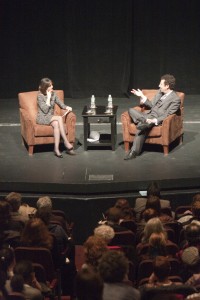
For Ithaca College’s Distinguished Speaker in the Humanities series, the School of Humanities and Sciences brought the Pulitzer Prize-winning playwright and screenwriter Tony Kushner to campus Monday.
Claire Gleitman, professor and chair of the department of English, hosted a question and answer session with Kushner, who was scheduled to appear at the college Feb. 21, but canceled because of a professional emergency.
Gleitman, who has studied Kushner’s work for almost two decades and teaches a one-credit honors seminar titled “Tony Kushner and Angels in America,” was excited to speak with the playwright in person.
“It was exciting to see how his mind works,” she said. “To hear him talk and reflect on his work and works he respected. … He was very funny, very quick, very generous.”
As a medieval ages major at Columbia University studying the millennium, the apocalypse and forces greater than humans, Kushner knew he wanted to write plays. He said he believes they are the best forums in which to attempt to explain the inexpressible.
Kushner said his attraction to theater comes from its duality as written word and performance. Never did he want to be a novelist or a poet, but he said he wanted his words to be spoken on a stage, and experienced and reacted to by a live audience.
“Theater is a really remarkable form,” Kushner said. “It’s the only thing I do that I feel genuinely confident in. … I find the amphibious nature of playwriting really exciting.”
Kushner is known for the play, “Angels in America: A Gay Fantasia on National Themes,” which is now an adapted HBO miniseries. He is also noted for contributing to the musical “Caroline, or Change” with Jeanine Tesori and the Steven Spielberg film “Munich” with Eric Roth.
After a 90-minute discussion with little mention of his work, the audience was given 30 minutes to ask Kushner their own questions. Only three had the chance to talk. They asked Kushner about his inspiration for the main character in “Caroline, or Change,” why American drama has yet to address the impact of Sept. 11 and the effect YouTube and new technology have had on theater.
Freshman Shawn Steiner, who is majoring in film, photography and visual art, attended the event on a whim. With little prior knowledge of the speaker, Steiner said he enjoyed Kushner’s presentation.
“He was interesting to listen to, and having not read any of his plays, it makes me wish I had,” Steiner said. “However, I wish that he would have elaborated more on the plays he had written.”
Kushner has written several other plays and won multiple awards. His newest play, “The Intelligent Homosexual’s Guide to Capitalism and Socialism with a Key to the Scriptures,” will premiere Off-Broadway at the Public Theater in May.
During the lecture, Kushner discussed his inspirations for his work, daily life with his husband and his addiction to television. He also explained the influential politics of the era in which he wrote “Angels,” the nation’s current state of affairs and the community of playwrights in which he lives. Citing his love for “The Simpsons,” Kushner also joked how he is set to retire after “Angels” appeared in this season’s first episode.
Senior Jenna Grossman, a drama major and Kushner fan, said she found the discussion inspiring.
“I left feeling really positive,” she said. “Overall, he’s just a very humble, articulate, passionate and funny guy who happens to write brilliant plays.”
Kushner is regarded as one of the only leading theatrical figures in the U.S. who feels that American drama is not approaching a standstill — though he believes commercial theater like Broadway is nonsensical because “theater does not make sense as a for-profit venture.”
Kushner’s renowned fame and esteem prove how artisans and scholars of all backgrounds can still make an impact in an increasingly technological world through forms as pure and simple as words.
A staged reading of “Angels in America” will take place at 7 pm Thursday in Hoerner Theatre.




